A cottage famous for inspiring Led Zeppelin songs is soon to become the newest Micro Nation in the world - and wants you to join.
The former childhood holiday home of Led Zeppelin vocalist Robert Plant, Bron yr Aur in the southern foothills of Eryri National Park is now striking out on its own.
The cult following of the band has caused chaos for its owner, former record label boss Scott Roe, for years – people travelling from across the world to turn up at the gate and asking to live there, take pictures, inviting themselves and their film crew in.
He hopes to now unite those who find Bron yr Aur a “magical, inspiring” place by inviting people to become citizens of Bron yr Aur (Hill of Gold) Independent Nation.
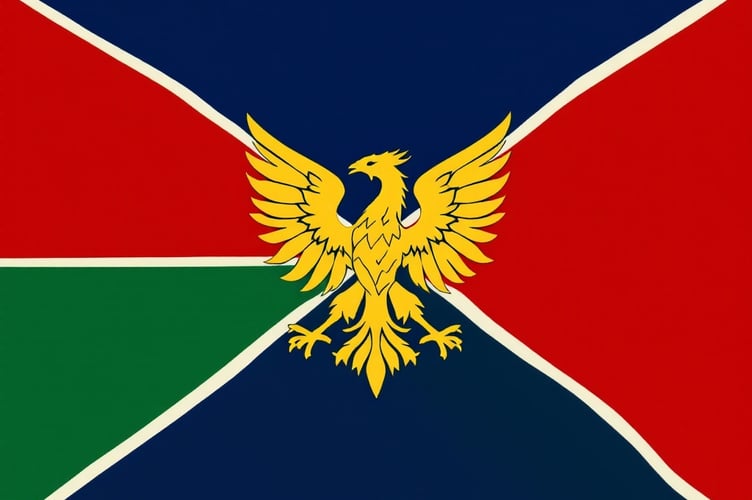
Aiming to establish embassies across the world, Scott has already commissioned the writing of a national anthem by Grammy-winning Chance McCoy, with plans on foreign aid, taxes, currency and healthcare.
This month, the Bron yr Aur state is launching its drive to recruit its first 500 founding citizens.
Scott, who lives in the modest two-bed cottage with his teenage daughter, explained the place is a lot more than a one-time 1970 writing retreat for the band – the place is off-grid with zero broadband and grows 80 per cent of the household's fruit and veg.
Scott, who now works in ecology and is a singer-songwriter under the name Boohai, said: “Lots of people see Bron yr Aur as an island, like a separate entity from the rest of the world – so did Led Zeppelin – it's what Jimmy Page [Led Zeppelin guitarist who returned to the cottage after 50 years back in 2023] and I talked about for a long time.
“That’s what sparked it – it's his fault really.
“Staying off grid is quite powerful as the decades roll by – it's something a lot of people crave.
“Chatting to the many people who have visited, sometimes with interpreters, the common thing isn’t really about the band.
“Bron yr Aur has become a symbol of peace and being away from the world’s complexity and the noise.
“It’s a place that makes you have extraordinary experiences.
“That’s what led to this.”
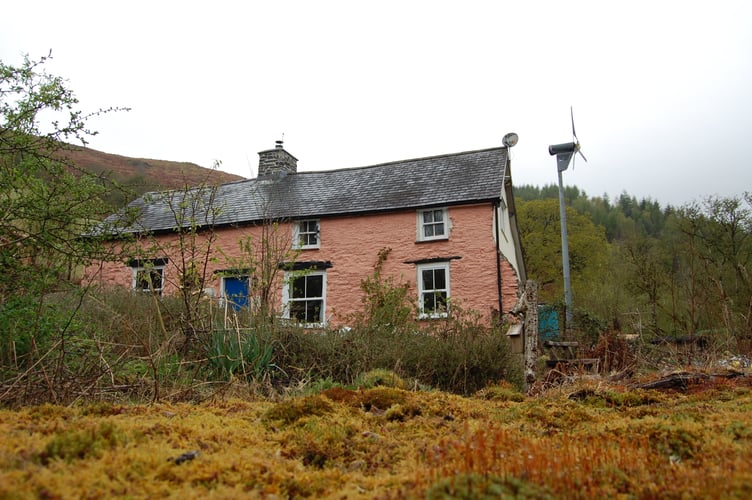
Many people who visit the half-acre of land describe something special about the place overlooking the misty Dulas valley, red kites soaring with no sound but birds and lambs.
Having capitalised on its many visitors by offering writing and recording retreats and glamping trips, the sloped land is now scattered with spots for bell tents amongst the veg patches, chicken coop, wood store, swing and summer house.
The house, far from spectacular, is a quaint 18th-century ex-barn that had at one point been close to falling down, recently painted a faint pink in keeping with its former lime covering.
This caused uproar with fans that it hadn’t been kept perfectly as it was since 1970, or better yet, converted into a museum.
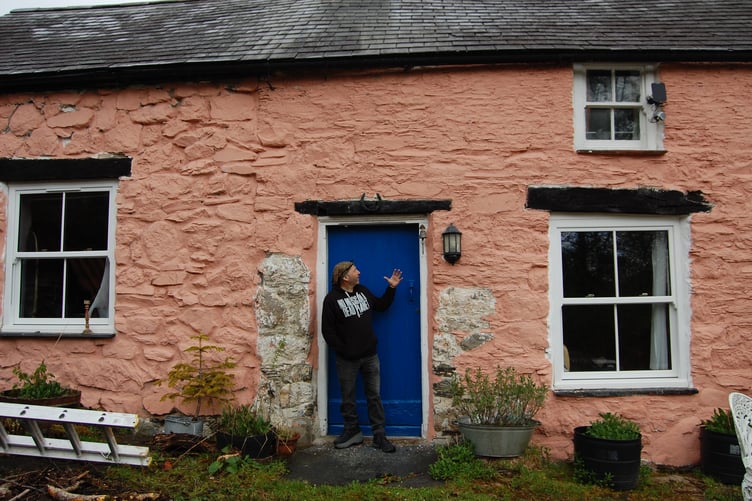
Scott now hopes to grow Bron yr Aur’s impact on the world through its citizenship – and in doing so, create a global network of creatives.
The self-awarded nation will be funded by wealthy benefactors and income from its creative projects.
Citizenship will be awarded on a sliding scale from free to £5,000, offering a health plan including poetry, art and music prescriptions, visits to the headquarters on retreat, and benefits including discounted access to “associated territories”, be that a hotel in nearby Machynlleth or a recording studio in Paris.
Citizenship will come with voting rights, not forming a government as such, but more a “sharing of the load” with volunteers given special privileges.
By declaring independence from all other governments, it joins the ranks of weird and wacky patches of land across the world that don't become recognised states, but nonetheless are cult-level popular with followings that admire the anarchistic sentiment of wanting to step away from their ruling authorities.
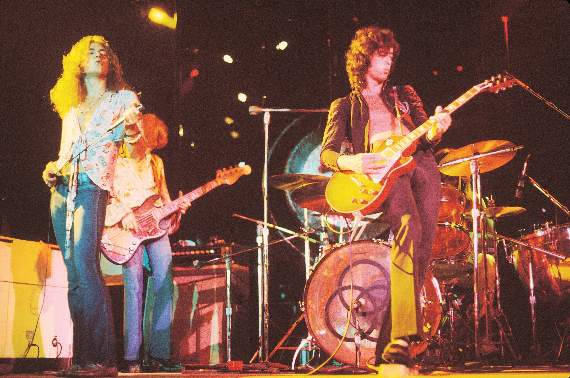
This is at the core of declaring independence, says Scott - inspired by John Lennon and Yoko Ono’s ‘Nutopia’ - a conceptual country that exists ‘in your mind’ with ‘no laws other than cosmic’.
Scott said: “Nutopia was an anti-war protest – questioning the culture of land and military force.
“Making soil shouldn’t be an act of rebellion, but it is.
“Almost half the countries on the planet are involved in some kind of conflict.
“So many people are sick of their government's bloodshed.
“We’re not saying we can stop war but claiming independence provocatively to the world stating that art is an important part in that story - all art forms and finding a voice.
“We’ll be able to encourage creativity and access to the arts by those who can pay for it, supporting those who can’t afford it.”
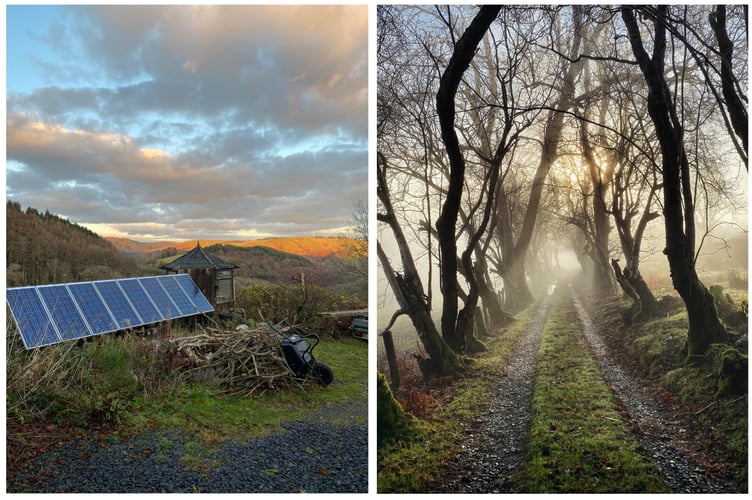
The pillars of the new nation are creativity, wellbeing and sustainability - the nation will have a ‘peace chest’ instead of a ‘war chest’, similar to a hardship fund, supporting access to creative practices and wellbeing resources.
He plans to create virtual galleries out of citizens' art with open access: “Wherever they are in the world, they can turn over their passport and be recognised – get a cheap lunch, access a yoga retreat, create an album in a studio – kind of like a loyalty scheme”.
From the chat with Jimmy Page where the idea sparked in Scott’s head to becoming the first citizen of Bron yr Aur has taken a lot of work – from writing the constitution, legal framework, designing citizenship structures, passports, stamps, money - the world's youngest nation now has a coat of arms, a flag and is ready for its next 499 citizens to come on board.
The founding citizens will have their names carved on commemorative stones.
He aims to open an embassy (cum-live-music bar) on the Machynlleth high street by the end of the year, whilst Plas Dolguog, an upmarket hotel in the town, has become one of the first “associated territories”.
Taking advantage of the many hundreds of people who have asked to work, stay, collaborate with Scott aka Boohai and gain access to Bron yr Aur, the nation already has 70 global partners, and he says the interest is there: “A lot of people want to join this.”
Will Bron yr Aur actually become a recognised nation?
Micro Nations are entities that claim to be an independent state, but who are not recognised by the international communities.
Some can be described as a “performative expression of libertarianism”, whilst others are tongue-in-cheek and playful, using the gimmick of a Micro Nation as a tourism pull such as in Key West island off the south coast of Florida who claimed independence following a road block in the 1980s, or Ironland – a 12 metre diameter circle in North Carolina founded by YouTuber Christopher Thomas in 2024.
It’s been a stuttering but growing trend in the 20th century, including Sealand (a platform in the North Sea off the coast of England claimed as its own nation by a family who lived there in the 60s), Molassia (11 acres in Nevada claimed as its own territory in 1977) or Ladonia (1km in Sweden established in 1996 by an artist who had fought against Swedish authorities for over a decade to stop his sculptures from being demolished).
Scott and his crew working behind the scenes to get this Micro Nation off the ground aren’t “naive” he says – they aren’t holding their breath for recognition from other nations: “If we actually get recognition from other states - that could change the world forever.
“I’m not naive that we’ll become a powerful peace nation and join the table at the UN.
“This is the driving factor – we've gone through everything in modern times, we’ve tried everything, globally governments have repeatedly lied and not put their people first.
“We’ve clearly seen that no one under this system is able to deliver something that is for the people.
“But if stories like this spark a one per cent shift towards peace – it's worth a go, isn’t it?”
For this reason, they will also be requesting “something practical” - inviting world leaders and state officials to contribute words of peace to their peace chest.
However, when pushed for comment Welsh Government chose not to respond as to whether Bron yr Aur would be recognised by the Welsh state.
Independence – a hot word for Wales
Scott has had many sticky conversations online with people who say his work ‘stinks of colonialism’.
Having offered chats over cups of tea to those who have concerns about Bron yr Aur taking a dent out of Wales, Scott says his aim is for Bron yr Aur to be an opportunity for the world to recognise the unique language, culture and heritage of Wales: “I really care about heritage – there are people interested in joining this nation who haven’t heard of the Welsh language, who have heard of Led Zeppelin and not Wales.
“This is a really good way to promote Welsh language, heritage and the beauty of the place.”
Whilst stating the nation will be bilingual, his foreign aid policy backs up this stance, aiming to become the nation giving the most of its GDP to foreign aid – five per cent to local and global causes, whilst signposting citizens who visit the area to local partner businesses who will offer like-minded experiences.
Is it all Jimmy’s fault?
Having come to Bron yr Aur via his in-laws, one day, Scott found he never left.
Attempting to turn the tide on an increasingly polluting music industry, he was part of a grassroots movement to say there’s a way of doing it differently.
He ditched the tie for a trawl, and in doing so one day stumbled upon an old plectrum underneath some old slates whilst building a woodshed in his garden.
After some research, Scott realised it was a plectrum belonging to Jimmy Page, who had last visited Bron yr Aur in 1970 with Robert Plant to write their third album, with the tiny piece of plastic holding an estimated value of £250,000.
Scott then almost immediately lost the thing, falling from his back pocket whilst working on a slate quarry in the Centre for Alternative Technology.
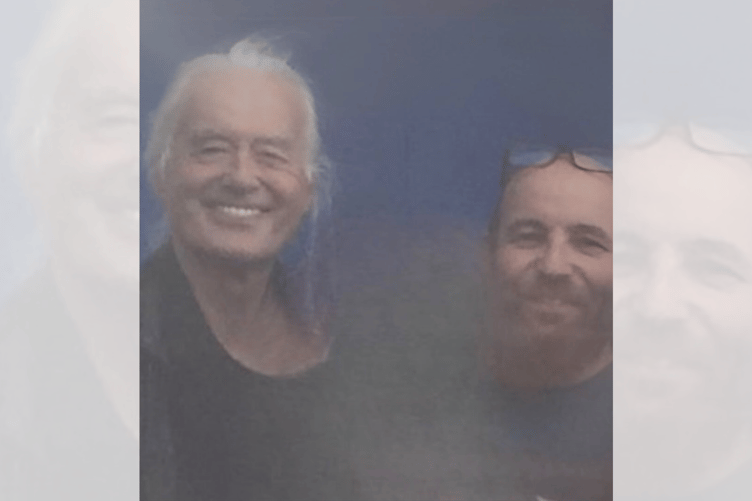
Ten days later, Jimmy Page appeared at Bron yr Aur gate, 53 years after his first and only visit.
Scott said: “I said to him, ‘I’ve lost your f****** plectrum!’
“I don’t believe in synchronicity every second, but that blew his mind too.”
Scott said Jimmy promised to replace the plectrum, but the better gift was in “becoming friends, getting to chill and chat about stuff”: “We had a long chat covering ecology, soil, music, the history of the place, the secret spots where they’d written.
“I could never escape Led Zeppelin – over the years, my dad was on the same circuit with those bands, later the first venue I promoted was where bands like Sabbath and Zeppelin cut their teeth.
“So it felt like meeting a long-lost uncle.
“We chatted about the world, about sustainability on the planet.
“It crystallised the importance of the place for creativity.
“For Robert Plant (who owns a property nearby), being in Wales was normal for him; he was here as a kid.
“Whereas for Jimmy, when he was younger and now, being here was really alien to him.
“Page sees it that he got given all this amazing stuff by Bron and by Wales – it's a really powerful non-ego stance, but he feels he got given it.
“Lots of people have created here since.”
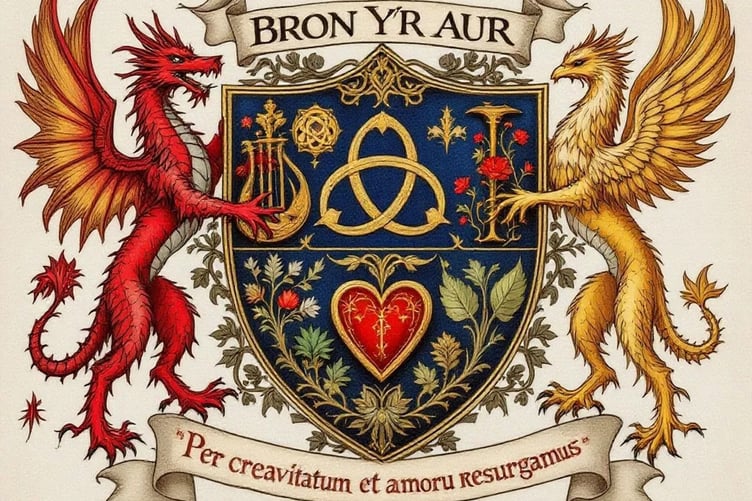
Scott, the new Duke of ‘the World’s First Creative Independent Micro Nation’, didn’t clarify whether Uncle Jimmy was an active part of the new age at Bron yr Aur.
Scott and his team are calling all dreamers, artists, peacekeepers and global citizens to become the first citizens of the world’s newest nation with the tagline, ‘the world has plenty of countries. But only one Bron Yr Aur’ – join the mailing list for updates on the website at https://bronyraur.com/
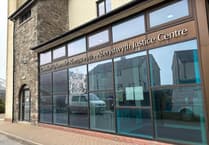
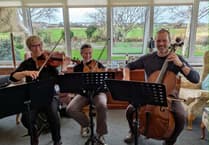


Comments
This article has no comments yet. Be the first to leave a comment.